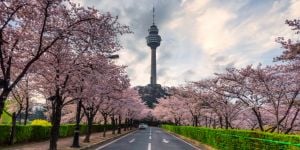
Modern and traditional, urban and rural, South Korea offers a wide diversity of experiences. One of the world's most high-tech nations, the country provides an advanced work setting against the background of lush forested national parks and small remote islands.
Why South Korea
South Korea is one of the world's most tech advanced nations and with this title come fast internet speeds and a motivating working environment with all the needed amenities.
One of the main benefits of setting up camp in South Korea is the internet with the average speed reaching 26Mbps ' one of the best in the world. A developed infrastructure and plenty of places to work from (coworking spaces, cafes, etc.) provide a highly efficient setting for working remotely.
Best cities to work from
Seoul, South Korea's capital, is home to over 10 million people and offers all the benefits of living and working in a big city paired with the charm of old Asia. The city's infrastructure makes remote working very convenient and the developed public transport system makes exploring the city and its suburbs easy and efficient. The capital is especially attractive for those interested in combining the convenience of an urban lifestyle with the proximity of gorgeous countryside getaways and picturesque islands.
Jeju Island is one of Asia's most up-and-coming nomad destinations as it promises what every remote worker aspires to: unbeatable web speed and coworking spaces with the backdrop of volcanic mountains, waterfalls, and beach resorts.
Daegu, the fourth biggest city in South Korea, is situated in the middle of a flat valley 80km from the seacoast. The city may lack Jeju's laid back atmosphere and Seoul's modern urbanity, and you won't find 'official' coworking spaces here. However, Daegu more than makes up for it all with a balance of well-preserved old traditions through festivals and architecture and free Wi-Fi hotspots that cover almost all of the city. Plus, Daegu's well-developed transportation network makes the city a convenient option for exploring the rest of the country.
The internet and coworking spaces
South Korea offers one of the best Internet speeds in the world. With the average of 26 Mbps, you will stay well-connected throughout the country ' whether you choose to settle in an urban centre or on a remote island.
Finding a place to work in South Korea will not be an issue. The country's vibrant coffee scene means that there are plenty of coffee shops that provide a relaxing work setting complete with signature coffee blends and delightful pastries. If you are looking for a more professional environment, there is no shortage of coworking spaces in big cities and even some of the islands.
Coworking spaces in Seoul
HIVE ARENA, Gangnam-gu, Nonhyeon-dong, 277-27 502
WeWork Samseong Station, 507 Teheran-ro, Samseong 1(il)-dong
Superegg place, 68-1 Susong-dong, Jongno-gu
CowNDog, 20 Wangsimniro 2(i)-gil, Seongsu 1(il)-ga 1(il)-dong, Seongdong-gu
FabLab Seoul, 116-4 Jangsa-dong, Jongno-gu
Coworking space in Jeju
Jeju Space, 3F Venture Maru 217 Jungang-Ro Jeju-, Jeju-si, Jeju-do
Leisure in South Korea
South Korea offers plenty of sights to see and things to do after work. If you are settled in a big city like Seoul, there are a lot of attractions to explore within the city itself: The War Memorial of Korea, Gyeongbokgung Palace, Seoul City Wall and many others. On top of that, a short ride away from the urban setting you can discover the country's rural side: national parks (Juwangsan National Park, Gayasan National Park, Seoraksan National Park, etc.), Islands (Seonjaedo, Hongdo, Deokjeokdo and many others). A tour of South Korea's demilitarised zone is one of the main historical attractions.
What to know before arriving
Residents from over one hundred countries can enter South Korea for a period from 30 to 90 days. If you do require a visa to travel to the country, you will need to apply for a tourist visa at a South Korean Embassy at your home country. If you are planning a longer stay in the country, there are a few long-term visas available. One of the most popular types of visas is the E-2 visa issued to teachers of English. If your remote work allows you to spare some time for another occupation, this may be an option to consider.
Useful links:
We do our best to provide accurate and up to date information. However, if you have noticed any inaccuracies in this article, please let us know in the comments section below.







Comments